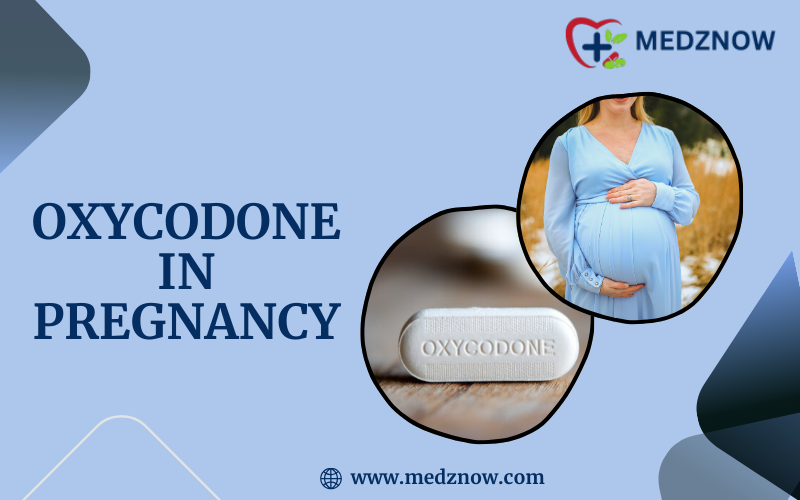Pregnancy is a delicate condition for both the mother and the developing baby. Often, prompting medication concerns are taken during this period. Oxycodone is a potent opioid pain reliever that is used for managing moderate to severe pain. However, the use of Oxycodone in pregnancy raises several questions, such as what category is Oxycodone in pregnancy, can you take oxycodone while pregnant, and is it safe to take Oxycodone while pregnant. The potential risk of Oxycodone to both mother and fetus requires careful consideration. In this blog, we will explore the effects of Oxycodone during pregnancy, possible risks, safety guidelines, and alternatives to Oxycodone.
Potential Risk Of Oxycodone In Pregnancy:
Oxycodone and pregnancy are very curious and significant issues because Oxycodone carries several risks to the mother and the developing baby. Use of this powerful opioid can leads to dependency, complicate childbirth and postpartum recovery. That makes a series of challenges for the mother. You are taking Oxycodone while pregnant, which may lead to harmful outcomes. Such as
Miscarriage:
Miscarriage is common in any pregnancy for many different reasons. It is the death of a baby in the womb before 20 weeks of pregnancy. In some research, if women use Oxycodone during pregnancy increases the chance of miscarriage.
Birth Defects:
If women can take Oxycodone while pregnant, that can increase and affect to baby’s development and cause birth defects, such as congenital heart defects, gastroschisis, glaucoma, and neural tube defects.
Neonatal Abstinence Syndrome(NAS):
This problem is one of the most risky of Oxycodone use during pregnancy is neonatal abstinence syndrome. That can lead to withdrawal symptoms in the baby after birth. NAS symptoms include tremors, irritability, poor feeding, vomiting, diarrhea, and difficulty breathing. It is a very serious condition, the baby needs to be hospitalized for treatment.
Placental Abruption:
This is one of the very serious effects caused by using Oxycodone in pregnancy. In this condition, which placenta separates from the uterus before birth. As result, the baby never gets enough oxygen and nutrients. And women may experience serious bleeding.
Preterm Labor And Preterm Birth:
In this condition, labor or birth happens early, before 37 weeks of pregnancy. An early birth baby has more health problems and risks for complications. A baby can experience some health issues such as respiratory issues, brain complications, Digestive issues, and Infections.
Guidance On Oxycodone Safety Use In Pregnancy
Pregnancy is a very sensitive condition, Oxycodone is not a safe option for pain relief during pregnancy. If necessary to use Oxycodone in pregnancy that consult with the health care provider who can assess the potential for dependence and withdrawal symptoms. Here are some key guidelines for using Oxycodone safely in pregnancy.
- Oxycodone is classified as a category C drug, which means this drug is not relevant to use during pregnancy and it poses an increased risk to the fetus. Never use this drug in pregnancy.
- Required to manage pain during pregnancy. Talk to the doctors about prescribing a weak opioid drug such as Codeine, dihydrocodeine, or Tramadol. These drugs are less effective and harmful than Oxycodone.
- If a patient wants to manage the pain through non-opioid medications and non-pharmacological treatment, such as Hot and cold packs, TENS, pain management programs, and physiotherapy, to minimize the risk of pregnancy.
- If the patient can take Oxycodone during pregnancy, then take a low effective dose for the shortest possible duration.
Alternative Option Of Oxycodone During Pregnancy
It is important to manage pain during pregnancy; however, avoiding medication that may harm the developing fetus. Oxycodone is not an acceptable pain reliever in pregnancy due to potential risks. Here, the following several alternative pain management options depend on the patient’s condition, response to the treatment.
- Acetaminophen (Tylenol): Acetaminophen is a safer pain reliever medication than opioids, which are recommended for mild to moderate pain during pregnancy. But, avoid excess use and be careful about the prescribed dosage.
- Physical Therapy: If the pain is musculoskeletal, then physical therapy and exercise is recommended in pregnancy that help to improve posture and relieve muscle tension.
- Non-Pharmacological Pain Reliever Method: During pregnancy, if you experience severe pain. Using these non-pharmacological methods, such as acupressure, Massage therapy, and Heat or cold packs.
- Specific Supplements: certain supplements (magnesium or calcium) may help to manage pregnancy-related pain(leg cramps and muscle spasms). Supplements are not only recommended for pain, but also helpful for other health issues.
- Psychological Techniques: These techniques such as yoga, meditation, exercise that help with stress, anxiety, and pain. These techniques are generally safe and helpful for the pain management plan.
What to Do If You Are Pregnant and Using Oxycodone?
If you are pregnant or planning to be pregnant. However, you can still take oxycodone, then immediately. Contact with health care provider immediately, they can asses your condition and might suggest a change in medication or dosage. Never stop the drug suddenly because Oxycodone withdrawal may be dangerous for both mother and baby. Consult with the doctors, who can guide the safe withdrawal process. After birth, the baby can experience withdrawal symptoms (NAS). immediate required medical treatment.
Conclusion:
Generally, Oxycodone is avoided during pregnancy unless necessary. If it is required to use, then it should be taken under strict medical supervision to minimize risk to both both and the developing baby. Always try to use non-opioid medications and non-pharmacological treatment for pain management.

